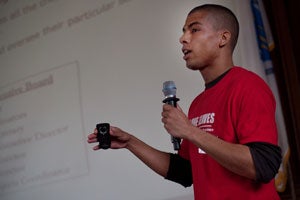
More than 100 law students, lawyers, and community activists from around the country gathered at Harvard Law School November 15-16 to learn about Project No One Leaves, the HLS student initiative that has had remarkable success in keeping Boston neighborhoods intact despite the foreclosure crisis.
The two-day conference, “Community Response to the Foreclosure Crisis,” organized by the Harvard Legal Aid Bureau, drew participants from 15 states and Washington, D.C., to discuss the multi-pronged model that HLS students and their community partners have devised to staunch the foreclosure crisis, including canvassing neighborhoods to inform tenants and homeowners of their rights, drafting ground-breaking legislation to protect tenants, landing big verdicts against banks for not keeping properties in good repair, and helping people buy back their foreclosed-on homes at prices they can afford.
Conference participants came from Miami, Chicago, Minneapolis, St. Louis, Providence, Philadelphia, New York, New Jersey, and California and elsewhere, as well as from other cities in Massachusetts including Chelsea, Springfield and Worcester. The foreclosure crisis has decimated many communities, leading to urban decay, homelessness, and increased crime. Boston is the only city in the US that is having success in beating back the crisis, in large part due to the HLS students and their partners in Project No One Leaves, which was featured in a two-part series on PBS NewsHour last month.
View Part 1 and Part 2 of the series.
Perhaps the most innovative aspect of No One Leaves is the unique buy-back program devised by the HLS students, City Life/Vida Urbana, and Boston Community Capital, a financial institution whose mission is to build healthy communities where low-income people live and work. Through this program, more than 60 tenants and former homeowners in Boston have bought back their foreclosed-on homes at prices they can afford, keeping neighborhoods intact and helping residents avoid homelessness. During the conference, Pat Hanratty, who heads up a real estate acquisition arm of BCC, led a workshop to describe how her institution negotiates with banks post-foreclosure to buy back homes at their present market value, a price much lower than the outstanding mortgage amount, then resells the homes back to the former tenants or owners at a price they can afford. Hanratty said she has talked with dozens of institutions around the country that are interested in establishing similar programs to help tenants and former homeowners buy back their homes.
“We built this not just for Boston, but to get beyond Boston,” Hanratty said. She also predicted that the foreclosure crisis will not go away soon. “This problem will be around for at least another five to 10 years,” she said.
Barry M. Bloom ’61, a lawyer whose clients include private equity firms, said he was drawn to the conference to learn about the home buy-back program. “We’d like to organize funding in New York, New Jersey, and Connecticut,” he said. “It’s difficult to find long-term financing for people who’ve been foreclosed on.”
 Monday’s panels also included a community organizing workshop led by leaders from City Life/Vida Urbana, a community organization based in Jamaica Plain that has worked closely with HLS on No One Leaves. Another panel discussed using legal tactics to fight post-foreclosure evictions and to support community organizing efforts.
Monday’s panels also included a community organizing workshop led by leaders from City Life/Vida Urbana, a community organization based in Jamaica Plain that has worked closely with HLS on No One Leaves. Another panel discussed using legal tactics to fight post-foreclosure evictions and to support community organizing efforts.
Early on the second day of the conference, participants headed into Boston with HLS students to canvass foreclosed-on properties, in order to learn how to establish similar outreach programs in their communities.
Also on the second day, professors from HLS and Tufts University were scheduled to provide an overview of the current state of foreclosure policy nationwide. Duncan Kennedy, the HLS Carter Professor of General Jurisprudence, was slated to moderate the panel, including Howell Jackson ’82, the James S. Reid, Jr. Professor of Law at HLS; Katherine Porter ’01, the Robert Braucher Visiting Professor of Law at HLS; and Rachel Bratt, a professor in the department of Urban and Environmental Policy and Planning at Tufts University.
Students from a number of law schools and universities were scheduled to meet at the Harvard Legal Aid Bureau at 1:30 to discuss building effective on-campus anti-foreclosure programs. Students from Suffolk Law School are doing anti-foreclosure work in Chelsea, Mass., and students from Boston College Law School and Tufts have participated in Project No One Leaves. Skadden Fellows, Equal Justice Work Fellows, and Americorps Fellows were scheduled to help students develop ideas and provide practical advice for launching new programs.
The conference also included an exhibit by Boston photographer Kelly Creedon in conjunction with City Life/Vida Urbana and the Bank Tenant Association, called the We Shall Not Be Moved project, which documents the grassroots movement to stop the eviction of families after foreclosure in the greater Boston area.
The conference is set to culminate at the weekly City Life/Vida Urbana meeting in Jamaica Plain, where students meet with tenants and homeowners who need legal assistance, and where community organizers discuss strategies for saving neighborhoods.